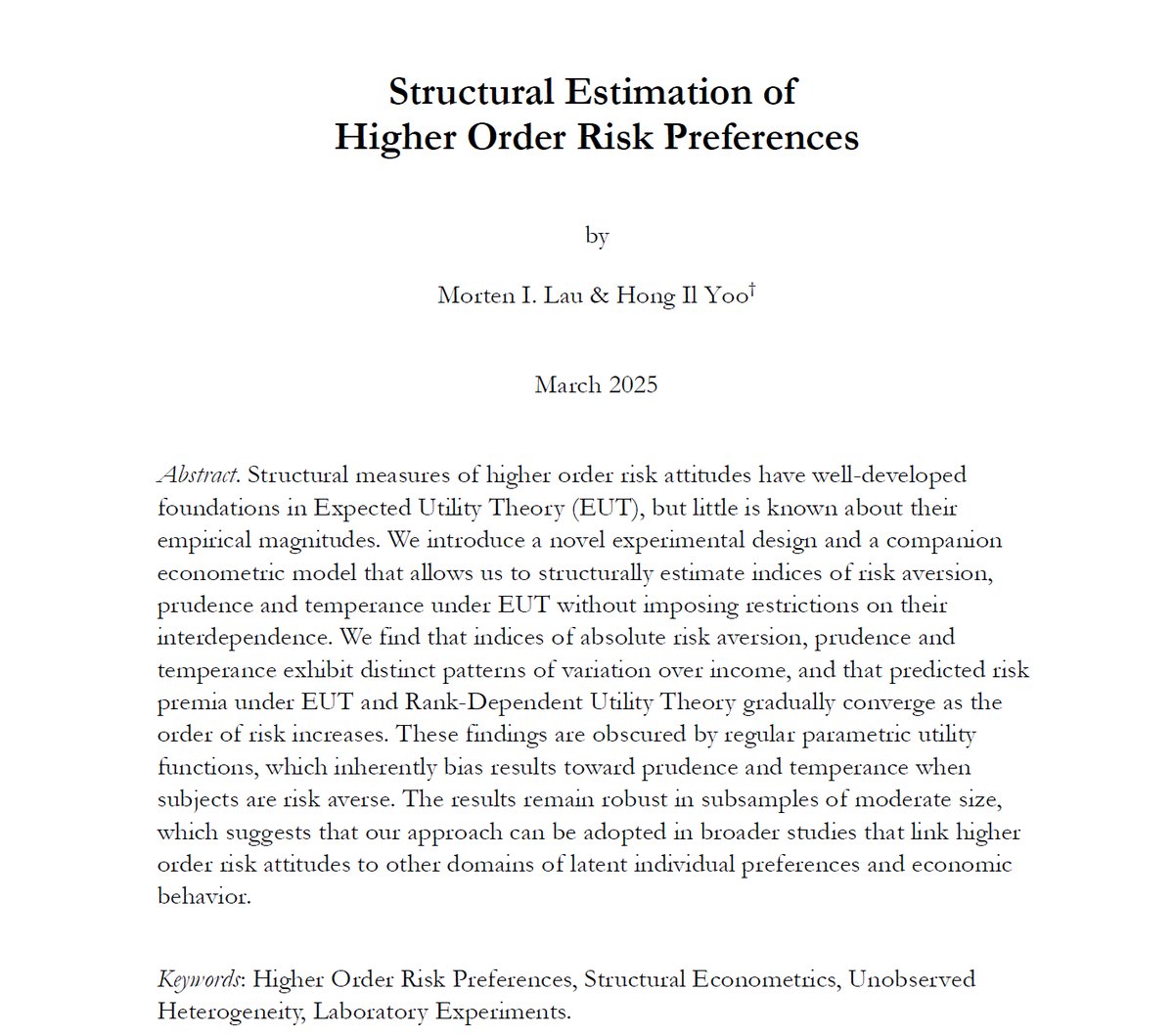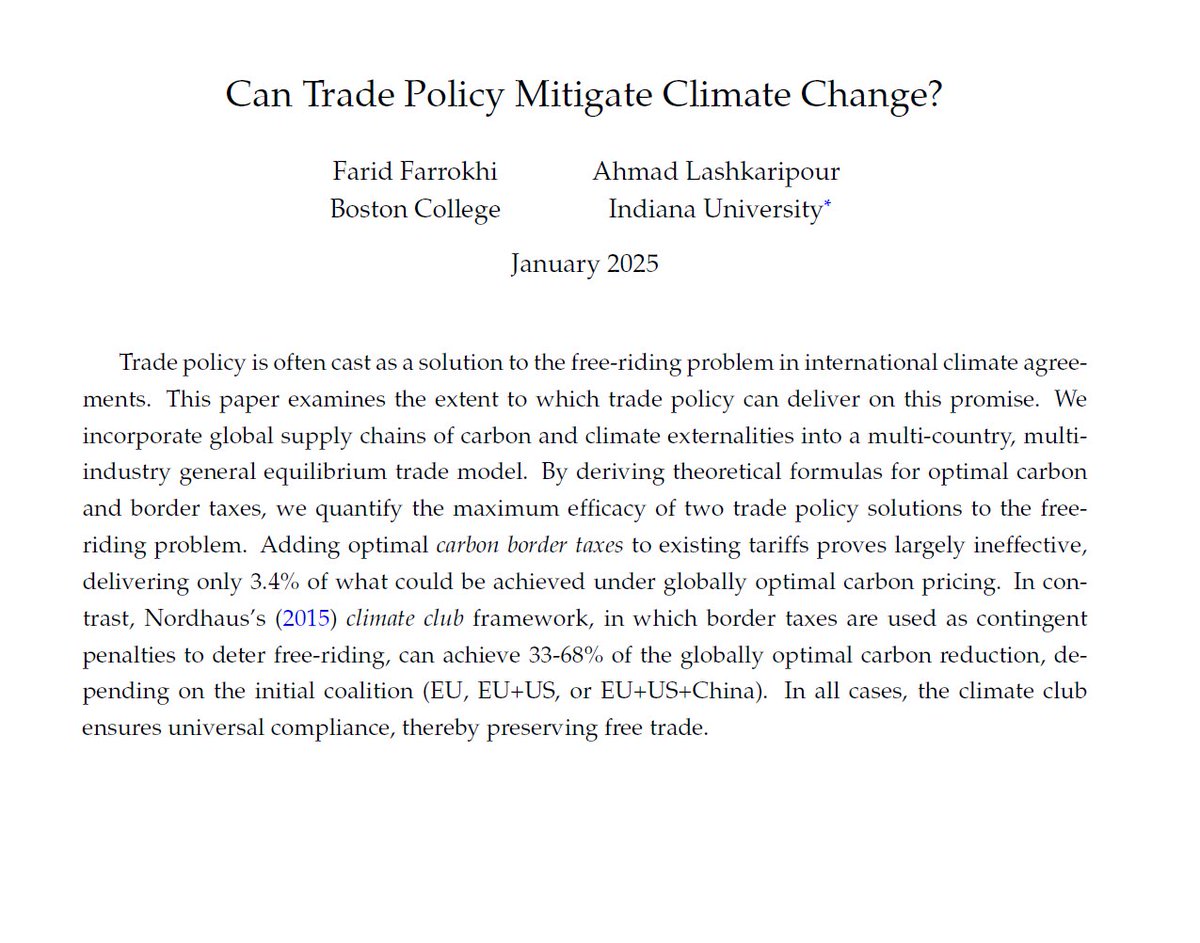
Econometrica
@ecmaEditors
Followers
53K
Following
1
Media
322
Statuses
415
News from the editors of econometrica
Joined July 2020
Governments use their countries’ economic strength from financial and trade relationships to achieve geopolitical and economic goals. We provide a framework of the sources and uses of geoeconomic power. Mixing macro theory and international relations. https://t.co/RBRjF417M5
3
133
466
Foundation models are stuck in the past, but they intentionally produce natural-sounding and varied responses. These can lead to hallucinations. We explore the limitations of foundation models and how RAG can address these so chat, search, and agentic workflows can all benefit.
5
11
41
From Côte d’Ivoire to the U.S., social obligations to share income are common. @ElianaCarranza, @AletheiaDonald, @florian_grosset and @supKaur show their welfare benefits may come at a cost: lower labor supply and productivity. https://t.co/Qc1nTSCEfv
1
23
115
How to quantify consumer surplus in love of variety/quality ladder models? Supplier addition/separation helps identify key statistic without functional form assumptions. Crucial input for policy questions & comparative statics in growth & trade models. https://t.co/qkelwkz10a
0
27
129
U.S. municipal bonds remain illiquid; this article links this illiquidity to underwriter-driven complexity and quantifies the welfare gains from mandating standardization. https://t.co/t3JGNvAUtN
1
8
65
a significant jump in initial claims, large enough to have good odds carries through increase next week. if we have that progression indicates a recession has or already started. not conclusive this week on its own. seasonal adjustment in line.
5
4
20
We show a long-run player who repeatedly observes private signals and takes actions can sometimes establish a reputation even when their strategy is not identified. Our result applies to games of deterrence, delegation, signaling, and Bayesian persuasion. https://t.co/x5ydPHTY3B
1
33
151
Could a highly desirable agent accept a partner that a less desirable agent would reject? When matching requires search in time-changing environments, this paper proves this impossible only where more desirable agents are more patient and less risk-averse. https://t.co/G5DsLJjqe6
2
41
109
Can transparent admissions rules increase access to college? This paper shows two thirds of Texas’ Top Ten Percent Plan’s impact came from information, not mechanical effects, admitting low-income students who outperform those they displace. https://t.co/9zrHzLHg7w
2
62
216
We introduce a novel experimental design and econometric model to estimate risk aversion, prudence, and temperance without imposing their interdependence. Our approach unmasks variation in risk attitudes that existing modeling approaches may obscure. https://t.co/yID9Ro1ZfC
1
21
117
Can private insurance fill gaps from public disability insurance (DI) cuts? Studying a German reform, Seibold, Seitz & Siegloch find modest private DI take-up, no adverse selection & efficiency gains, but an equity case for public DI. https://t.co/Vk1dCvbQVC
1
11
56
Analyzing scientists' biographies during the baby boom, we find that mothers have a unique life cycle pattern of productivity. Children reduce the productivity of mothers but not fathers, with important implications for promotions and participation. https://t.co/z1BzM2Tv3m
1
74
187
We study how trade policy can reduce global emissions. Unilateral carbon border taxes have limited efficacy at cutting foreign emissions. By contrast, coordinated trade penalties under a climate club prove highly effective. https://t.co/dH5mIGe0gJ
4
85
261
We are excited to announce that the following new associate editors with expertise in economic theory joined the editorial board of Econometrica on July 1st, 2025: Piotr Dworczak (Northwestern University), Ryota Iijima (Princeton University), & Yves Sprumont (Deakin University)
1
6
35
We are excited to announce that the following new associate editors with expertise in political economy joined the editorial board of Econometrica on July 1st, 2025: Hülya Eraslan (Rice University) and Eric Weese (Tokyo University).
1
10
48
We are excited to announce the following new AEs with expertise in IO, labor, and applied micro: Francesco Decarolis (Bocconi University), Thomas Lemieux (VSE), Mathias Reynaert (TSE), Eduardo Souza-Rodrigues (University of Toronto), and Andrew Sweeting (Maryland University)
1
6
60
We are excited to announce that the following new AEs with expertise in macroeconomics and international economics joined the editorial board of ECMA on July 1st, 2025: Jennifer La'O (Columbia University), Michael Peters (Yale University), & Stephen Redding (Princeton University)
1
5
61
Ready to lead with data and AI? Follow Snowflake for strategies, success stories, and insights that help you stay ahead. 🚀
37
8
533
We are excited to announce that the following new associate editors with expertise in econometrics joined the editorial board of Econometrica on July 1st, 2025: Alexei Onatski (University of Cambridge), Adam M. Rosen (Duke University), and Jörg Stoye (Cornell University).
1
5
61
We are thrilled to have Aureo de Paula (UCL), Keisuke Hirano (Penn State), Pete Klenow (Stanford), & Marciano Siniscalchi (Northwestern) join the board as coeditors, starting July 1st. They will handle papers on a wide range of topics in IO, econometrics, macro, & economic theory
1
12
119
Co-editors Kate Ho and Chad Jones left the editorial board at the end of June 2025. We are very grateful to them for their contributions. The journal has greatly benefited from their insight and energy.
0
1
20





















